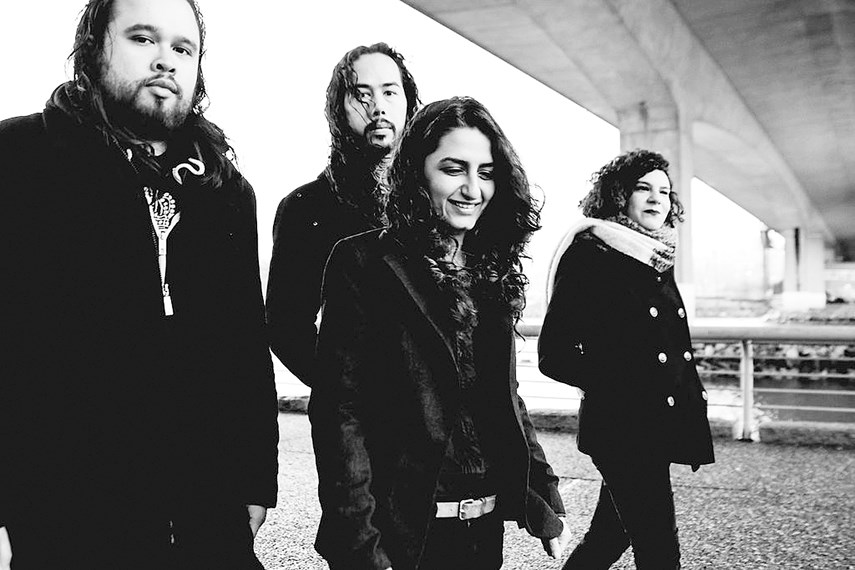Massive Scar Era perform with Tyr, Orphaned Land, Ghost Ship Octavius and Aeternam, Rickshaw Theatre, May 15. Advance tickets $28 (plus service charges). For more information and to reserve tickets visit rickshaw.com.
She went underground for metal.
The term “underground music” usually refers to the unsigned bands that whimpered out of your college roommate’s iPod. But in Egypt, during singer Cherine Amr’s formative years, heavy metal had literally gone underground.
In 1997, Egyptian authorities jailed more than 80 young metal heads, or mateela, on charges of disturbing the peace and contempt of religion. Most were released but the country’s metal scene contracted; leaving Amr to scour Alexandria basements and bar cellars for speed, death, doom, thrash and all the rest of heavy metal’s seemingly infinite subgenres.
It was a sound she’d been chasing since a friend flipped her a copy of Metallica’s S&M album.
“What is this?” she remembers demanding. “This is awesome!”
She’d been awash in the zig-a-zig-ah, Backstreet’s back era of ’90s pop music. She’d experimented with Staind. But this album had werewolves and devils and a song about cocaine addiction told from the point of view of the addiction; all of it adorned with piccolos and bassoons and flutes.
Amr remembers being left with three words: “Give me more.”
Dial-up Internet and government censorship slowed the entry of death screams and inverted fifths into Egypt but every time a friend travelled to a metal-friendly nation they smuggled cassette tapes back to Amr.
Soon enough, she saw herself on one of those dank, subterranean stages. Her family was less enthused.
“That was a big no-no for my mom,” she recalls.
Her mother had seen the soundproof studio where Amr wanted to practise.
“This is a place that if you scream, nobody is going to hear you,” her mother pronounced.
That edict, as well as Amr pushing her friends to take drum and bass lessons, resulted in the only female metal group in the region: Massive Scar Era.
Based largely on the extreme novelty of a teenage girl metal band, the group was offered the chance to play their first major show on the lip of the Mediterranean Sea outside the new Library of Alexandria – and over the objections of Amr’s mom.
“I can never forget it,” Amr says.
The band wasn’t good. Amr’s guitar went in and out of tune while Nancy Mounir played the violin like she was trying to win a gold fiddle from the devil.
When Amr talks about the show she sounds like she’s talking about a band she’s seen rather than one she was in.
“You can tell that this band, if they worked, might go somewhere,” she says.
The band put together a string of original songs and formed a sound that drew influences from the aggression of Korn and Metallica while Mounir’s melodic violin gave the band its conscience and its roots.
Their music dealt with warfare and crisis as well as the sexism that greeted their passage into the hyper-masculine world of metal.
“That’s something that we, as girls, we didn’t expect at all,” she says, explaining she and Mounir grew up in an all-girls school that left them ignorant of the worst male-female dynamics.
In concerts, Amr started calling the female fans to walk from the back of the room to the front of the stage.
“If you want to do a mosh pit or something you can do it at the back,” she remembers telling the guys in the crowd.
Bringing female fans to a spot where they could feel safe wasn’t an act of feminism, it just made sense, she explains.
Shortly after being called feminists they were branded Satanists.
The question – the one she got at her day job in a Cairo office – still seems to rattle her.
“Cherine, do you worship the devil?”
The question arose after a newspaper described her and Mounir as “devil worshippers,” she says.
“It was really painful,” she recalls.
Many bands have been accused of allying with Satan (remember when KISS supposedly stood for Kids in Satan’s Service?) but in Egypt the charge carried weight. The band were left with two choices, Amr recalls. They could “surrender completely,” repudiate Satan and prove their piousness. The other option was to defend themselves on the grounds of human rights. Amr laughs when she talks about the latter option. “The lawyer told me: Don’t even try.”
She remembers picking her most inoffensive clothes and inoffensive words while gathering eyewitnesses to prove that she prays regularly. She is a believer, she says. But she didn’t feel she should have to explain that to the government.
In 2015, Amr moved from Egypt to Vancouver. She currently works a day job in Kay Meek Centre’s marketing department.
But while she didn’t seem Muslim enough for Egypt she wonders if she seemed too Muslim for a United States border guard.
Amr was on her way to the SXSW music festival in Austin, Texas when she was turned away at the Peace Arch border.
She recalls deleting Middle Eastern music and a Koran app from her phone before hitting the border. She had a visa but was told she needed a P2 work permit.
The turn-away, she notes, came shortly after U.S. President Donald Trump’s travel ban.
Massive Scar Era’s new single “Colour Blind” is an effort to: “shed a light on something that people take for granted.”
The track is part of a forthcoming EP the band laid down at Rain City Recorders.
While the songs are still metal, Mounir and Amr have both delved into pre-colonial Egyptian music.
“You will hear it and it and you will just feel like you are in the middle of the desert,” Amr says of the new songs. “I’m trying to understand what really shaped our music in the first place.”
Their music is still underground, but it seems to be slowly moving into the light.



